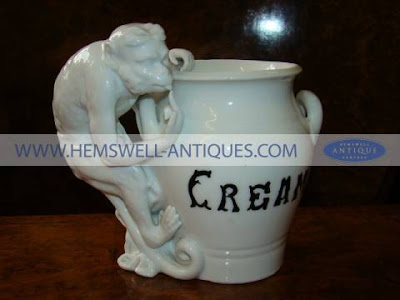(First edition of Gaudy Night from 1935.)
Sheridan Le Fanu was a Victorian writer who wrote uncanny tales, including an early vampire story, "Carmilla," that inspired Bram Stoker. My favorite Le Fanu story is "Green Tea," which appeared in the collection In a Glass Darkly in 1872. It's about a man who is driven insane by drinking green tea.
(1884 edition; image from Book-Aesthete, which you should check out if you like looking at old books.)
These are the things I love about "Green Tea:"
1. The idea that green tea is a dangerous substance. It might be especially dangerous if you combine it with late-night writing, which is what happens to the Rev. Mr. Jennings in this story. He says that he believes everyone who writes "does his work, as a friend of mine phrased it, on something -- tea, coffee, or tobacco." I think that might be right. I've certainly been in Mr. Jenning's place: up late at night writing and drinking tea. Mr. Jennings says, "I had a little kettle on my table, that swung over a lamp, and made tea two or three times between eleven o'clock and two or three in the morning, my hours of going to bed." That sounds like a pretty sweet set-up to me. Also, Mr. Jennings and I are writing on the same topic. He's writing a work on "paganism." I prefer to call it "classics," and I don't think that it actually brings evil spirits into the world to haunt you, but Mr. Jennings and I can agree to disagree.
(I think Mr. Jennings must have something like this tea kettle on a burner stand. So elegant! And yet deadly.)
(This green tea tin looks so innocent.)
2. The word "hippish," which shows up a lot in this story. It means "somewhat depressed," and it comes from the word "hypochondria," so it can mean being a little depressed because you imagine you might be sick. I'm going to use this word so much from now on! "How are you?" "Oh, a student of mine sneezed on an exam, and now I'm feeling a little hippish."
("The Hypochondriac," Honore Daumier, 1841. This is kind of how I picture the Rev. Mr. Jennings.)
3. There are so many narrators! First of all, there's the character who writes the introduction and says he has edited the story from his employer's papers. He's an interesting guy -- a former medical student, now a sickly eight-fingered secretary -- even though we will never hear from him again in the story. Then there's the employer, Dr. Martin Hesselius. He's the fictional narrator of all of the short stories in In a Glass Darkly. He's a German doctor with a philosophical bent, a reassuring bedside manner, and some very weird theories about the "spiritual fluid" in the brain. And then, of course, there's the Rev. Mr. Jennings. I love a story with layers.
(Mr. Jennings and his demon, illustrated by Edward Ardizzone in 1929.)
4. A spectral monkey with glowing red eyes. If I ever see one, I'm giving up tea and classics immediately.
(This green tea canister looks particularly demonic.)
(Oh, and look what's being sold right next to it! An "Unusual Cream Jar with Monkey!" For the most terrifying tea experience ever.
5. The creepy library in Mr. Jennings' house. I love ghost stories set in gloomy old houses, but a scary library in a gloomy old house is even better: "The room was lofty, with two tall slender windows, and rich dark curtains. It was much larger than I had expected, and stored with books on every side, from the floor to the ceiling. The upper carpet -- for to my tread there were two or three -- was a Turkey carpet." And then, for extra creepiness: "I stepped into this perfectly silent room, of a very silent house, with a peculiar foreboding; and its darkness, and solemn clothing of books, for except where two narrow looking-glasses were set in the wall, they were everywhere, helped this somber feeling."
(I would really like my own creepy library. Especially if it came with a secret door.)
6. You know who else liked Sheridan Le Fanu? M.R. James. He gave a talk on Le Fanu in 1923, which you can read here. "I do not claim for this author any very exalted place," he said, "but I desire to advance the claim that he has attained supremacy in one particular line: he succeeds in inspiring a mysterious terror better than any other writer."









Awesome ! Great Article for Green tea really i am Empress Thanks for sharing
ReplyDeleteThank
green tea in night
benefits of green tea at night
can we drink green tea at night
drinking green tea at night